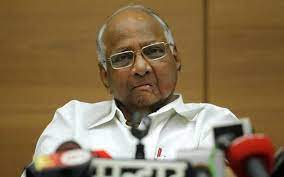


A few days ago, a political worker who had once seen better days made an interesting observation. He believed that every Indian man loves to be pampered and unlike his Western counterpart, cannot be independent in his entire life. At the end of the day he is the most vulnerable person, always seeking validation—whether from his wife, his children, his family or his friends. The more powerful the job of the Indian man, the more vulnerable he is. The Indian politician, he continued too falls under this category – he is the weakest human being, also in constant need of validation.
When Nationalist Congress Party chief Sharad Pawar announced this resignation last week to a packed audience comprising of his loyalists, followers, leaders, party workers and family members in Mumbai, hell broke loose. It was even more startling to see grown up men (and women, but more men in particular, mainly tall leaders of the party) crying out loud in public. Three days later, Pawar reversed his decision of resigning but not before giving rise to numerous memes and stories on his main reasons for doing so.
While reams of newsprint has been spent on speculating Pawar’s decision – from cutting down to size his nephew Ajit Pawar’s ambitions to elevating his daughter’s position in the party, the fact that is mainly overlooked is that the Maratha strongman is cleverly doing what has been known for all these years – empowering his political party and himself in particular.
The survival issue happened when he had broken off from the Congress to form his own party in the nineties. He has survived for 20 plus years since then. At eighty plus years of age, Pawarsaheb, is not looking for survival but instead trying to get a clue of what’s going on in the minds of the voters and opinion makers. Pawar appears instead to be negotiating not only with leaders like Nitish Kumar and Mamta Banerjee, but also with the Congress and BJP. At 82, he will grab the options he feels best suited for him and his party. He was tipped to lead the UPA as the Chairman around the same time in April last year, remember?
Alliances are not new to him, certainly not with the BJP. He did that way back in 1977-78 (he had a BJP man as the Home Minister then). This alliance too will not be for the first time for him. In the last decade alone, he had several opportunities to work closely with the Prime Minister too. He is not trying to understand the ‘mindset’ of the Prime Minster or the BJP. All he is doing is weighing what options are open to him while at the same time exploring the response and reading the minds of the voters as well as the opinion makers.
A pragmatic politician, Pawar believes that with a handful of MPs, there is no harm in negotiating for the top post, if need arises. After Deve Gowda became the Prime Minster of the country, there has been no embargo on how many MPs one’s party should have anyways. Even if Pawar becomes a Deputy Prime Minister in the near future, it will be a big achievement for him. The kids (nephew and daughter and others) will fall in line with what he wants. It all comes down to the patriarch, if he assumes some greater role in Delhi, none of them will be able to oppose him. It isn’t a question of Pawar’s survival anymore, but more of his promotion.
In 2023, Pawar politics is all about him and not about creating new leaders. Creation of new leaders happens one step at a time and Pawar has done that well over the years. Unfortunately the leaders he created, may lack Pawar’s drive as well as vision. Despite this fact, Pawar realises that he cannot discount everyone from the party. The objective of having a political party is to contest, win elections, create leadership and in the end be in power. It just isn’t a question of leaving behind legacies through inheritance ( both Nitish Kumar and Navin Patnaik’s politics are doing fine without any legacies) but more about uplifting the party and in the end making it invincible, something Pawar envisioned for the NCP when he first founded it. What Pawar is doing is part of the political process. Like said earlier, he is negotiating with all the players and reading the minds of the people who matter. When you negotiate, you don’t take any decision, you sound people off. You negotiate to make people aware that you are going to take a decision. Interestingly they start negotiating instead.
Just months after the Maha Vikas Aghadi (MVA) came to power, I had the good fortune of witnessing the ‘architect of MVA’ Pawar in action in his Y B Chavan office in Mumbai. People from all corners of the state as well as outside would wait for hours to gain entry into his office to meet him. And he would meet each and every one of them too. The scene would resemble something out of a temple, where devotees would come in hordes to meet their deity. Though not in power, the scenes are repeated even today, not only in Mumbai but wherever Pawar is known to pay a visit.
Which leads me to the conclusion that while Maharashtra state may have many deities in its realm, Maharashtra politics may have its only God in the form of Sharad Pawar, and the latter knows this very well too.